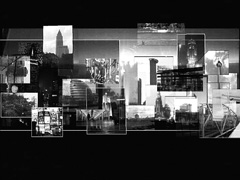Fort of the Fabrications
(“Kyoko no toride”) JAPAN / 2004 / Japanese, English, others / Color / Video / 32 min
JAPAN / 2004 / Japanese, English, others / Color / Video / 32 min
Director, Script, Researcher, Source: Taki Kentaro
This film is a bold attempt to conceptualize contemporary media society and the urban images at its core, applying video media as a tool to read and unravel them. Images of the mass media landscape are shown in chapters, using various symbolic aspects of media, audio and video noise as well as principles of the video medium spoken in different languages. Their accumulation creates a fabrication. While staying clear of the inanity of being a loudmouth as a proper ‘response’, this zestful film is a head-on plea for the possibility of art-in-practice through images.
[Director’s Statement] This is not a cinematic work, not a documentary, not just a story nor an abstract visual. This is a visual image that attempts to capture the contemporary society you see every day from a certain point of view.
By using video media as a tool to read and analyze contemporary media/information society, this experiment approaches the fabrication of the contemporary urban image through the difference between meaning and symbol in video imagery. Within this environment, I look for whatever possibilities visual imagery may have for the real world at an angle different from politics, science and philosophy. I began by attempting to discover what video media (you might also call it “electronic image”) was, then I looked at the various mass media landscapes based on this principle. Through this mass media landscape, I attempt to capture the homogenized world and capitalist system, and suggest the possibility that we can take a critical stance towards it.
The reasoning and the conclusions in this work are a little far-fetched, so the audience might become uncomfortable with its irony and insubstantiality. However, we are indifferent to the transformation of today’s urban space and living environment itself into video media (or “electronic image”). This work was made to give us the chance to consider again the obstacles in front of us created by this situation.
 Taki Kentaro
Taki Kentaro
Born 1973 in Osaka, Taki Kentaro completed a graduate degree at Musashino Art University. Selected for the Agency for Cultural Affairs’ Overseas Study Program for Artists (2002) and a recipient of the POLA Art Foundation grant for overseas training of artists (2003), he studied media art at HFG-Karlsruhe in Germany. In addition to visual production and writing, he teaches at Waseda University’s Kawaguchi Art School, and is also the director of VIDEOART CENTER Tokyo. He has participated in Transmediale (1998), Microwave International Media Art Festival (2001), Leeds International Film Festival (2001), International Film Festival Rotterdam (2002), Philip Morris Art Award (2002) and Ongoing (2002). Awards include the Grand Prize of Media Installation at the Fukui Biennale 8 (2000), the Organizer’s Award at the International Videofestival Bochum (2005), the Grand Prize and the Peter Cook Prize at the Graz Art Project BIX Media Competition (2005). |
